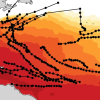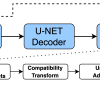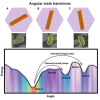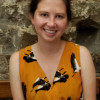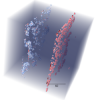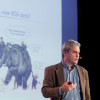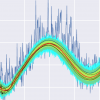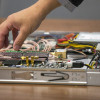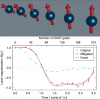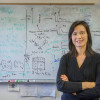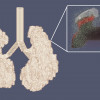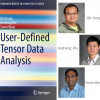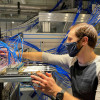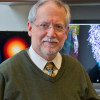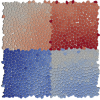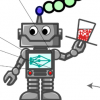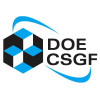News Center
Computer Models Show Role of Climate Change in Intense 2020 Hurricane Season
A computer modeling study of the historic 2020 North Atlantic hurricane season found that human-induced climate change played a major role. Read More »
New Encoder-Decoder Overcomes Limitations in Scientific Machine Learning
Thanks to recent improvements in machine and deep learning, computer vision has contributed to the advancement of everything from self-driving cars and traffic flow analysis to cancer detection and medical imaging. Using deep learning semantic segmentation, a method that labels each pixel of an image, computers have surpassed humans in solving classic image classification, detection, and segmentation problems. Despite many advancements, there is an increasing need for powerful, user-friendly… Read More »
San Francisco and Berkeley Lab Team Up on Pioneering Climate Study
Berkeley Lab computational resources are helping the City and County of San Francisco adapt to the Bay Area's changing climate and the extreme storms it is expected to bring. Read More »
Osni Marques Takes on New Role with Exascale Computing Project
Osni Marques, a staff scientist in the Applied Math and Computational Research Division, has been tapped to lead the Training & Productivity effort within the Exascale Computing Project. Read More »
Computational Analysis Enables Breakthrough in Biomolecular Dynamics
A new study with data analyses from Berkeley Lab computational researchers helps broaden the physical understanding of biomolecular assembly. Read More »
CCSE’s Hannah Klion Selected for 2022 Rising Stars
Hannah Klion, a postdoctoral researcher in the Center for Computational Sciences and Engineering, has been selected to be part of this year's Rising Stars conference. Read More »
Lindsay Bassman Awarded Prestigious Marie Curie Fellowship
AMCR’s Lindsay Bassman has been awarded one of Europe’s most competitive and prestigious postdoctoral fellowships — the Marie Skłodowska-Curie Actions — to continue her work in quantum thermodynamics. Read More »
Advancing New Battery Design with Deep Learning
A team of researchers from Berkeley Lab and UC Irvine has developed deep-learning algorithms designed to automate the quality control and assessment of new battery designs for electric cars. Read More »
Michael Mahoney Tapped to Lead the Machine Learning and Analytics Group
Berkeley Lab’s Scientific Data Division recently appointed Michael Mahoney to lead its Machine Learning and Analytics Group.
Read More »
Berkeley Lab Computing Resources Enable Deeper Understanding of Supernovae Explosions
An international research team recently made history by recording the earliest post-explosion detection of a Type Ia supernova, using cosmological models developed at Berkeley Lab and supercomputing resources at NERSC. Read More »
HYPPO: Leveraging Prediction Uncertainty to Optimize Deep Learning Models for Science
With a growing need for optimization tools that can enhance deep learning models and their training to improve predictive capabilities and accelerate time-consuming computer simulations, a Berkeley Lab team developed HYPPO, an open-source software tool for hyperparameter optimization of deep neural networks. Read More »
Open Sourced Control Hardware for Quantum Computers
To make engineering quantum hardware more accessible, the Advance Quantum Testbed has open-sourced a new electronics control and measurement system for superconducting quantum processors. Read More »
Cutting Through the Noise
Berkeley Lab’s AMCR and Physics divisions joined forces to create a new approach to quantum error mitigation - "noise estimation circuits" - that could help make quantum computing’s theoretical potential a reality. Read More »
AMCRD’s Sherry Li Part of Team Honored by SIAM for Best Paper
AMCRD's Sherry Li is co-author on a paper being honored with the 2022 SIAM Activity Group on Supercomputing Best Paper Prize. Read More »
SIMCoV Models Cell-by-Cell Spread of Respiratory Infections
Berkeley Lab computational research scientist Steve Hofmeyr is part of a team that developed SimCoV, which can provide a 3D simulation of a portion of the lung and model the ways in which COVID-19 and other viral infections spread in the lungs. Read More »
Berkeley Lab’s FasTensor Provides Pain-Free Big Data Analysis
With FasTensor, researchers in Berkeley Lab’s Scientific Data Management Group developed an open source tool to help its users efficiently process and analyze their massive datasets. Read More »
Crucial Leap in Error Mitigation for Quantum Computers
Researchers at Lawrence Berkeley National Laboratory’s Advanced Quantum Testbed (AQT) demonstrated that an experimental method known as randomized compiling (RC) can dramatically reduce error rates in quantum algorithms and lead to more accurate and stable quantum computations. Read More »
David Brown to Step Down as AMCR Division Director in Early 2022
David Brown, who has served as the research division director in Berkeley Lab’s Computing Sciences Area (CSA) for more than a decade, will step down in early 2022. Read More »
How a Novel Radio Frequency Control System Enhances Quantum Computers
A team of physicists and engineers at Lawrence Berkeley National Laboratory (Berkeley Lab) successfully demonstrated the feasibility of low-cost and high-performance radio frequency modules for qubit controls at room temperature. Read More »
Berkeley Lab Researchers Honored with Best Paper Award at QCE21
Two researchers from the Applied Mathematics & Computational Research Division are co-authors on a paper selected as Best Paper in the Quantum Computing and Systems Track at the 2021 IEEE International Conference on Quantum Computing and Engineering. Read More »
Student Research Opens New Doors in Quantum Image Processing
When Mercy Amankwah joined the Computing Sciences Area’s Summer Program in June 2021, she’d never worked in quantum computing before and found the subject intriguing, but intimidating. By the end of the summer, she had helped advance the field. Read More »
Summer Students Use AMReX to Study Cancer Cell Migration
As part of Berkeley Lab's 2021 Computing Sciences Summer Program, a team of undergrads led by senior scientist Ann Almgren got a little closer to understanding how groups of cancer cells may respond to different kinds of forces. Read More »
Deep Learning Tactics Speed Quantum Simulations
Berkeley Lab and UC Berkeley researchers are using an AI technique called reinforcement learning to optimize quantum simulations and speed the time it takes to create and test different quantum architecture designs. Read More »
New Alvarez Fellow Eyes New Applications for Math and ML
Osman Malik, the newest Berkeley Lab Alvarez Fellow, joined the the Applied Math and Computational Research Division's Scalable Solvers Group on September 1. Read More »
Berkeley Lab Hosts Record 11 CSGF Fellows in 2021
In 2021, Berkeley Lab will welcome a record 11 Department of Energy Computational Science Graduate Fellows (CSGF). Drawing from diverse scientific and engineering disciplines, the fellows share a common interest in using computing in their research. Read More »









